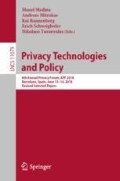Abstract
Static analysis is the analysis of software at compile time without executing it. Its goal is to explore all execution paths without needing specific inputs to drive the execution. Thanks to its wide coverage, this approach, and in particular taint analysis, has been widely applied to detect security vulnerabilities like SQL injections and XSS. The European General Data Protection Regulation requires all controllers of sensitive data to enforce an approach based on privacy by design and by default. In such context, verification and testing techniques can be applied to check if the system implementation follows the constraints identified at design time. Therefore, static program analysis might be applied to track how sensitive data is automatically managed by a software, and if such software could leak some of this data.
In this paper, we formalize and discuss how taint analysis can be extended and augmented in order to detect potential unintended leakages of sensitive data. Starting from the specification of how sensitive data is retrieved and it could be leaked, and what types of leakages are allowed by the privacy policy established by the controller of sensitive data, we apply standard taint analysis to detect potential leakages, we reconstruct the flow to check if the flow is allowed or not, and we report full details about all the flows not allowed by the privacy policy. This approach has been implemented on the Julia static analysis, and we report some promising experimental results on the OWASP WebGoat benchmark.
Access this chapter
Tax calculation will be finalised at checkout
Purchases are for personal use only
Notes
- 1.
- 2.
- 3.
The source code can be found at https://github.com/WebGoat/WebGoat-Legacy/releases/tag/v6.0.1.
- 4.
The Open Web Application Security Project, available at the web address https://www.owasp.org/index.php/Main_Page.
- 5.
- 6.
- 7.
References
Absint. https://www.absint.com/
Grammatech. https://www.grammatech.com/
Arzt, S., et al.: Flowdroid: precise context, flow, field, object-sensitive and lifecycle-aware taint analysis for android apps. In: Proceedings of PLDI 2014. ACM (2014)
Blanchet, B., et al.: A static analyzer for large safety-critical software. In: Proceedings of PLDI 2003. ACM (2003)
Burato, E., Ferrara, P., Spoto, F.: Security analysis of the OWASP benchmark with Julia. In: Proceedings of ITASEC 2017 (2017)
Clarke Jr., E.M., Grumberg, O., Peled, D.A.: Model Checking. MIT Press, Cambridge (1999)
Cousot, P., Cousot, R.: Abstract interpretation: a unified lattice model for static analysis of programs by construction or approximation of fixpoints. In: Proceedings of POPL 1977. ACM Press (1977)
Cousot, P., Cousot, R.: Systematic design of program analysis frameworks. In: Proceedings of POPL 1979. ACM Press (1979)
Cousot, P., Cousot, R.: Abstract interpretation: past, present and future. In: Proceedings of CSL-LICS 2014. ACM (2014)
Denning, D.E., Denning, P.J.: Certification of programs for secure information flow. Commun. ACM 20(7), 504–513 (1977)
Enck, W., et al.: Taintdroid: an information-flow tracking system for realtime privacy monitoring on smartphones. ACM Trans. Comput. Syst. 32(2), 5 (2014)
Ernst, M.D., Lovato, A., Macedonio, D., Spiridon, C., Spoto, F.: Boolean formulas for the static identification of injection attacks in Java. In: Davis, M., Fehnker, A., McIver, A., Voronkov, A. (eds.) LPAR 2015. LNCS, vol. 9450, pp. 130–145. Springer, Heidelberg (2015). https://doi.org/10.1007/978-3-662-48899-7_10
Ferrara, P.: Generic combination of heap and value analyses in abstract interpretation. In: McMillan, K.L., Rival, X. (eds.) VMCAI 2014. LNCS, vol. 8318, pp. 302–321. Springer, Heidelberg (2014). https://doi.org/10.1007/978-3-642-54013-4_17
Ferrara, P., Spoto, F.: Static analysis for GDPR compliance. In: Proceedings of ITASEC 2018 (2018)
Ferrara, P., Tripp, O., Pistoia, M.: Morphdroid: fine-grained privacy verification. In: Proceedings of ACSAC 2015. ACM (2015)
Grove, D., DeFouw, G., Dean, J., Chambers, C.: Call graph construction in object oriented languages. In: Proceedings of OOPSLA 1997. ACM (1997)
Hind, M.: Pointer analysis: haven’t we solved this problem yet? In: Proceedings of PASTE 2001. ACM (2001)
Kildall, G.A.: A unified approach to global program optimization. In: Proceedings of the 1st Annual ACM SIGACT-SIGPLAN Symposium on Principles of Programming Languages. POPL 1973. ACM, New York (1973)
Mathworks: Polyspace. https://www.mathworks.com/products/polyspace.html
Myers, A.C.: JFlow: practical mostly-static information flow control. In: Proceedings of POPL 1999. ACM (1999)
Nielson, F., Nielson, H.R., Hankin, C.: Principles of Program Analysis. Springer, New York (1999)
OWASP: Top 10 project 2017, March 2018. https://www.owasp.org/index.php/Category:OWASP_Top_Ten_Project
Pierce, B.C.: Types and Programming Languages, 1st edn. The MIT Press, Cambridge (2002)
Sabelfeld, A., Myers, A.C.: Language-based information-flow security. IEEE J. Sel. A. Commun. 21(1), 5–19 (2006)
Spoto, F.: The Julia static analyzer for Java. In: Rival, X. (ed.) SAS 2016. LNCS, vol. 9837, pp. 39–57. Springer, Heidelberg (2016). https://doi.org/10.1007/978-3-662-53413-7_3
Tip, F., Palsberg, J.: Scalable propagation-based call graph construction algorithms. In: Proceedings of OOPSLA 2000. ACM, New York (2000)
Tripp, O., Pistoia, M., Fink, S.J., Sridharan, M., Weisman, O.: TAJ: effective taint analysis of web applications. In: Proceedings of PLDI 2009. ACM (2009)
Wikipedia: Static program analysis. https://en.wikipedia.org/wiki/Static_program_analysis
Author information
Authors and Affiliations
Corresponding author
Editor information
Editors and Affiliations
Rights and permissions
Copyright information
© 2018 Springer Nature Switzerland AG
About this paper
Cite this paper
Ferrara, P., Olivieri, L., Spoto, F. (2018). Tailoring Taint Analysis to GDPR. In: Medina, M., Mitrakas, A., Rannenberg, K., Schweighofer, E., Tsouroulas, N. (eds) Privacy Technologies and Policy. APF 2018. Lecture Notes in Computer Science(), vol 11079. Springer, Cham. https://doi.org/10.1007/978-3-030-02547-2_4
Download citation
DOI: https://doi.org/10.1007/978-3-030-02547-2_4
Published:
Publisher Name: Springer, Cham
Print ISBN: 978-3-030-02546-5
Online ISBN: 978-3-030-02547-2
eBook Packages: Computer ScienceComputer Science (R0)

